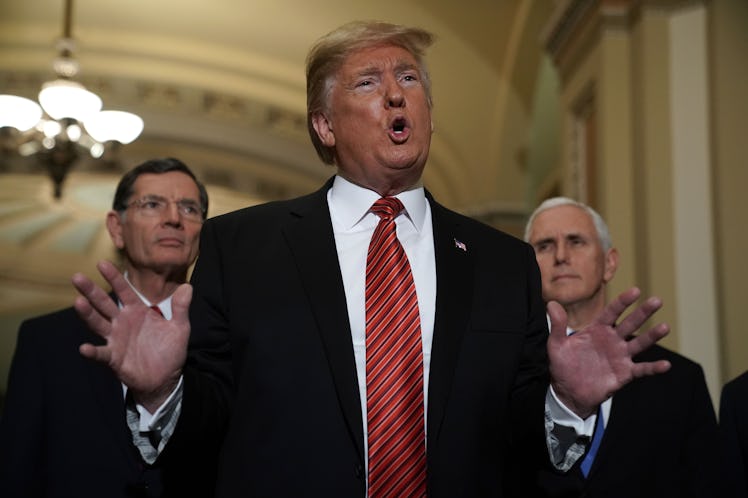
The Possibility Of Trump Declaring An Emergency Over The Border Is Trickier Than It Seems
President Donald Trump wants $5.7 billion to find his border security proposal — which includes a border wall between the U.S. and Mexico. He didn't manage to get the funding and so now the country is three-weeks deep into a partial government shutdown. If an agreement is not reached soon, can Donald Trump declare a state of emergency to build his wall? It seems pretty likely, although it's not without its complications.
Trump has suggested multiple times that he could bypass congressional approval for the money he's requested for a border wall by declaring a state of emergency, which would allow him to redirect funds from defense spending. In a press conference on Jan. 4, he told reporters that "I can do it if I want. I may do it," in reference to questions about a possible state of emergency. However, speaking to reporters on Thursday, Jan. 10, before heading out to the border in McAllen, Texas, the president said that he's "not prepared" to declare a state of emergency, according to TIME. But, he added, "I will if I have to." At the time, the president seemed to favor a compromise over declaring a state of emergency. He said,
We’re either going to have a win, make a compromise — because I think a compromise is a win for everybody — or I will declare a national emergency.
On the other hand, The Washington Post reported on Jan. 10 that the administration was laying the groundwork for a declaration. Elite Daily reached out to the White House for comment, but did not hear back.
So Trump has put the idea out there, but can he actually declare a state of emergency for the purpose of building the wall? Pretty much yes. Elizabeth Goitein, co-director of the Brennan Center for Justice's Liberty and National Security Program, pointed out in an article for The Atlantic that Trump could use Title 10 and Title 33 of the National Emergencies Act in order to justify building a wall without congressional approval. Under this law, "the president still has complete discretion to issue an emergency declaration," she wrote. Importantly, it doesn't really matter what the national emergency is for the president to invoke his executive power, as the "National Emergencies Act doesn’t require that the powers invoked relate to the nature of the emergency," she writes.
Under Title 33 of the National Emergencies Act, a president can declare a state of emergency and "reprogram" resources. For instance, in a state of emergency the president can terminate any "non essential" Army civil works projects and redirect the troops somewhere else. In terms of the matter at hand, Trump could potentially direct troops to build the border wall.
Another way for Trump to use the National Emergencies Act to build the wall is with under Title 10. The law allows the secretary of defense to take funds from Congress that have been set aside for military construction projects, but not doled out to specific projects yet. The funds can then be used to start a new military project that would "not otherwise authorized by law that are necessary to support such use of the armed forces."
However, there's a catch. The president, in invoking an emergency, must note which powers he intends to use, issue public updates if he wants to change them, and keep Congress in the loop about expenditures.
If Trump lands on declaring a state of emergency, there might be a way to push back — by getting rid of the national emergency altogether. And while under the National Emergencies Act the president has to sign off on ending a national emergency, Congress has the power to bypass him, if they've got enough votes. Stephen Vladeck, law professor at the University of Texas, Austin School of Law, told NPR that Congress can "terminate" a national emergency "without the president's approval," by getting two-thirds majority votes in both the House and the Senate, enough to override a presidential veto. However, Congress hasn't exercised the power to vote to end a national emergency at all in the 40 years since the National Emergencies Act was passed.
Moreover, if Trump actually moves to use the law to redirect military funds and labor, his declaration will most likely face some legal challenge, possibly over the source of the funds, per The Hill. But the potential declaration affords Trump and possibly Congress a win either way.
First, it could end the government shutdown. Negotiations on the wall could continue while the government opens its proverbial doors again and gets the gears rolling. Moreover, Congress could try to slow down the litigation so that a decision isn't reached until 2020, when it's possible Trump will be exiting the White House should he lose the election.
Whether or not Trump's border wall will actually get built if he declares a a national emergency isn't set in stone, but it might be the only tool he has left. On Jan. 9, the president held a situation room meeting with Democrats including Speaker of the House Nancy Pelosi of California and Senate Minority Leader Chuck Schumer of New York in an effort to end the government shutdown. According to The New York Times, the meeting ended with Trump storming out of the room after Pelosi said she would not fund any border security proposal that includes the wall. The president later denied the episode, and the White House did not respond to Elite Daily's request for comment on the matter. "She said 'No,' I said 'bye-bye'," the president later tweeted.
The government shutdown is dragging on, and the only way to keep it from going might be for Trump to declare a state of emergency and see what happens next. We'll all be waiting.